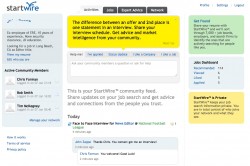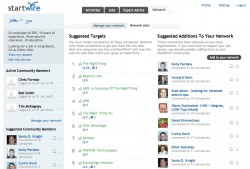![]() Among the first advice job seekers get about conducting a job search is to enlist their contacts in the effort. Do that, job seekers are told, by connecting with everyone, especially by using their “friends,” “1st degrees,” and other social network associates.
Among the first advice job seekers get about conducting a job search is to enlist their contacts in the effort. Do that, job seekers are told, by connecting with everyone, especially by using their “friends,” “1st degrees,” and other social network associates.
As About.com’s employment writer Allison Doyle says, “Connect with everyone you know, because you never know which contact may be able to help you with your job search or put you in touch with someone who can.”
Sound advice, but I don’t want to take it.
Huh?
First of all, I don’t want all my LinkedIn contacts to know I’m looking for a job, if I were, which I’m not, except if it’s a really interesting one, like the NFL editor job that my new best friend Chris Forman told me about last week. But I digress.
Alerting everyone you know, on- and off-line, has the virtue of creating an army of job spotters and broadens the connection links exponentially. A compelling story and a viral YouTube video also helps. That’s the upside.
The downside is that news you’re looking can quickly get back to your current employer. Or to others who you would rather they not know. And then there are the connections who are “friended” or linked-in simply because they asked. They might help, but looping them in on a job search is not a whole lot different than telling a complete stranger.
This is the dilemma that Forman, the former CEO of AIRS, and his partner, Tim McKegney, former AIRS EVP, are addressing with StartWire, the first product to emerge from the recruitment technology incubator they publicly introduced last month.
 Making its debut today, StartWire combines the best of online networking and job searching.
Making its debut today, StartWire combines the best of online networking and job searching.
“We think it’s a little bit all right,” Forman offered last week, as he walked me through the site. “The idea that has surfaced here is a really good one. We’ll see about the execution.”
Classic New Hampshireman understatement. To that I say I wish I had thought of this.
Here’s how the basics of StartWire work:
- After registering, seekers complete a jobs profile, and upload their resume. You also set job search parameters for geography, title, and the specific keywords. StartWire begins listing jobs that match your criteria. Indeed.com supplies the feed;
- Now you connect to your social networking sites. You can import your contacts en masse or selectively, allowing you to decide who is going to be invited to help in your job search;
- Contacts then get to opt-in to StartWire, which, in appearance, is much like a Facebook page;
- As you come across interesting jobs, you can flag them, and post a note to your contacts asking for help. Contacts can independently suggest jobs or advice, simply by posting an update the way they would on Facebook.
If that was all StartWire did, I would still be signing up if I were looking for a job, which I’m not, except, well, nevermind. But there’s a good bit more to StartWire both planned and already in place.
There’s a tab for “Expert Advice” that means what it says. Here, job seekers can post questions and get a response from a real, live career professional, who is paid to respond within a matter of hours.
Because contacts are doing the job seeker a favor, Forman and McKegney have taken pains to make it as easy on them as possible.
“We need to make it easy for people to help,” Forman explained. If it’s too hard or too time-consuming, help will be less forthcoming, but, as Forman observed, “I’m happy to invest a minute a day.”
 So while a community member (how StartWire describes your network contacts) can always log in to the site, they can also opt to get a daily digest of the job seeker’s activities. For now, they need to get into the site to post a response or a lead; within a few weeks, they’ll be able to simply do that via email.
So while a community member (how StartWire describes your network contacts) can always log in to the site, they can also opt to get a daily digest of the job seeker’s activities. For now, they need to get into the site to post a response or a lead; within a few weeks, they’ll be able to simply do that via email.
StartWire also allows job seekers to note which jobs they “Like,” which they’ve applied to, and which are “Not for me.” That’s a help to their community members who might wonder if a lead they have is of interest. The other reason for flagging jobs they’ve applied to is convenience.
As Forman noted when we spoke, most tracking systems offer a candidate self-service feature that, at a minimum, will let a candidate know the app was received, whether it’s active, and whether the req is still open. StartWire is taking advantage of that, and will soon offer job seekers an automatic status update for their applications.
It can’t say why a candidate was rejected or not considered, but it will “at least help” shine some light into the black hole, says Forman.
It wouldn’t be surprising if job seekers paid to join. But StartWire is free. The company will make its money by selling leads (resumes) to employers and job boards. Job seekers will be asked if they want to provide their resume. If they OK it, the referral is sold. The job seeker, meanwhile, gets broader exposure for their resume with no effort and, if it’s a recruiter who’s interested, it could result in a job.
“We think we’ve got something here that works for everyone,” says Forman. “It’s not a big business, but there is a niche.”
If nothing else, he says in that understated way, StartWire is an experiment in “how to unleash the power of social collaboration for job search.”